Resume
Student Nurse Cover Letter Examples

May 29, 2025
|
12 min read
Diagnose your career success with an effective student nurse cover letter. Learn to highlight your skills and passion, crafting a standout letter that truly beats the competition and opens the door to your dream nursing role.
4.70 Average rating
Rated by 348 people
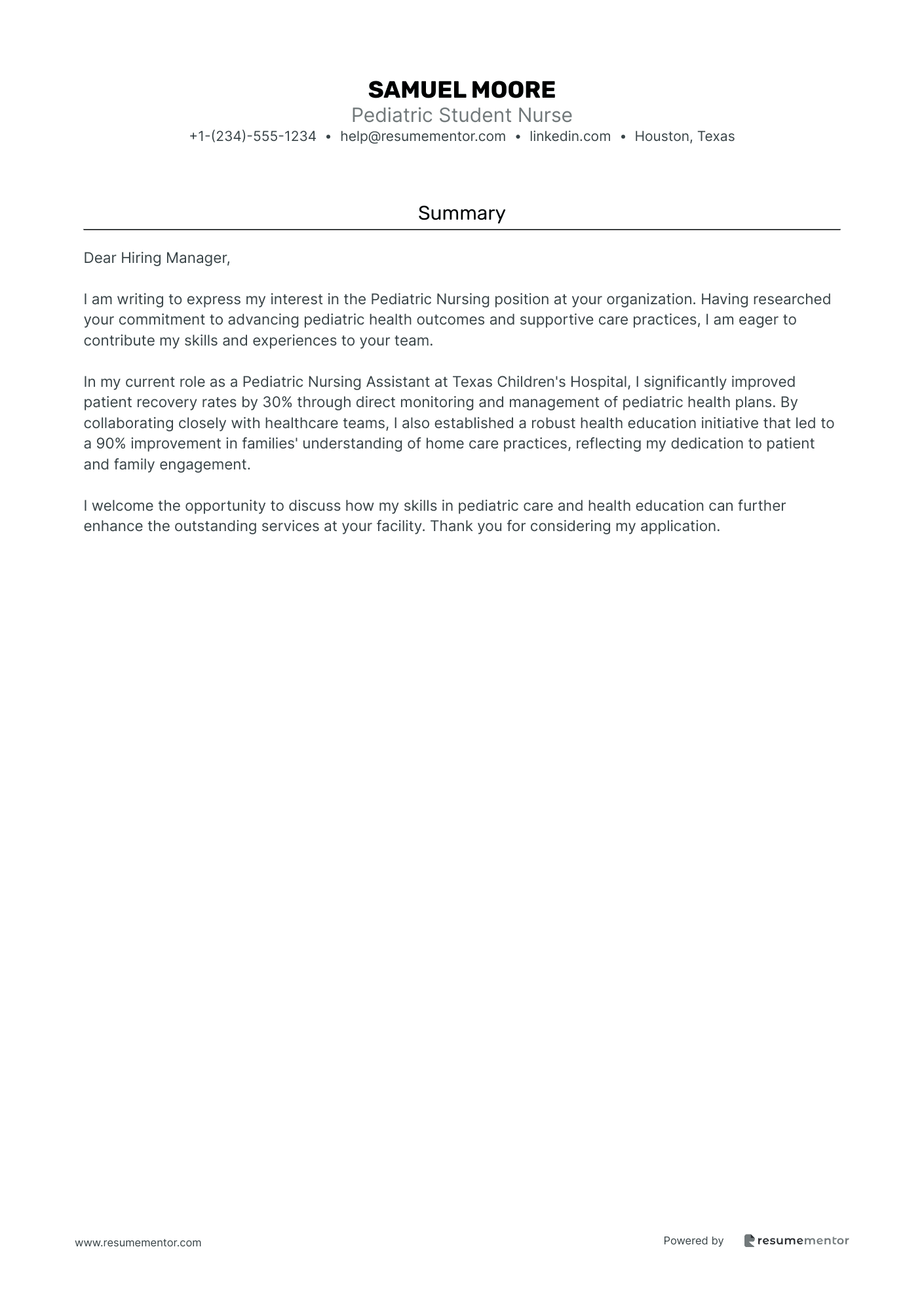
Pediatric Student Nurse
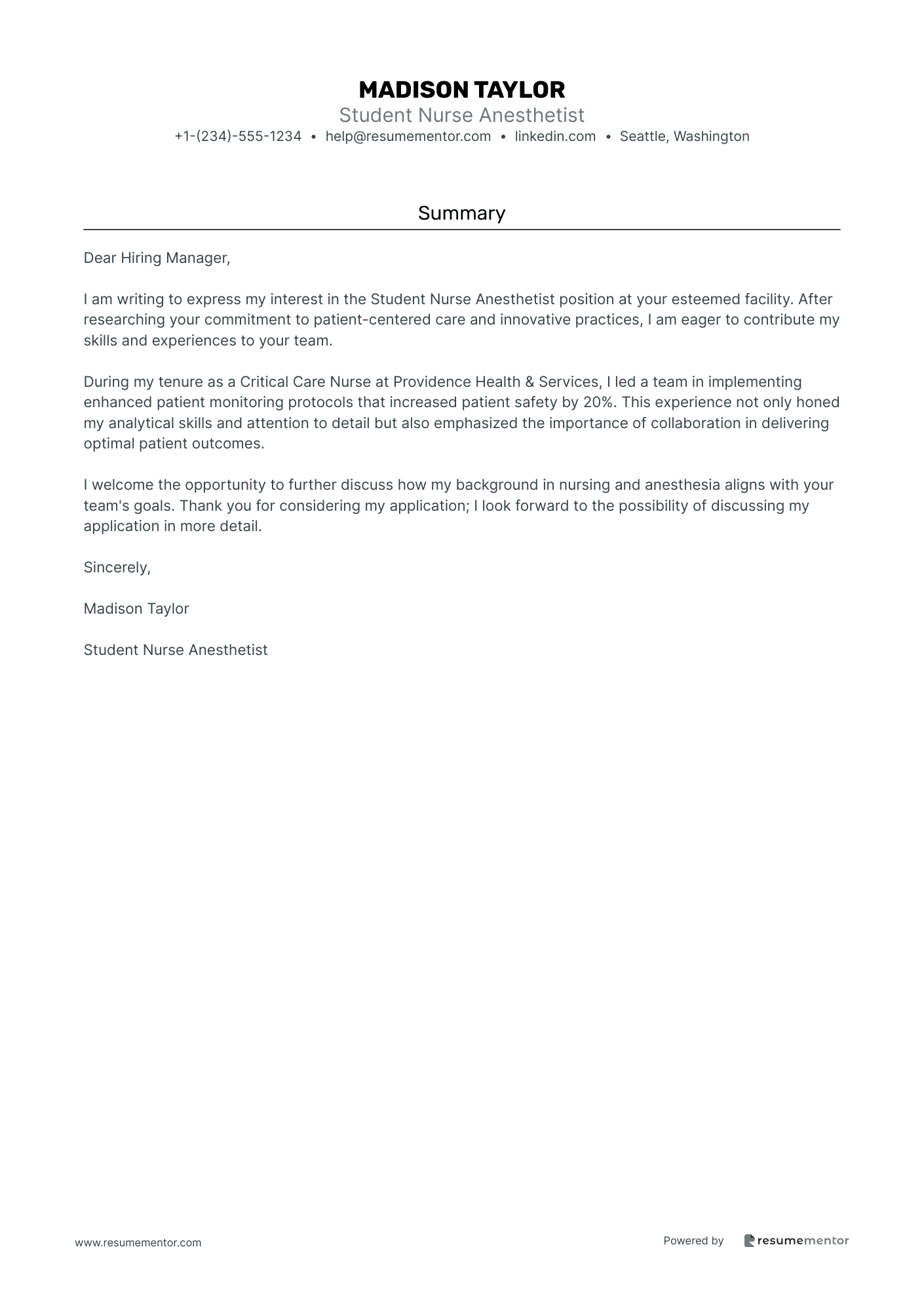
Student Nurse Anesthetist
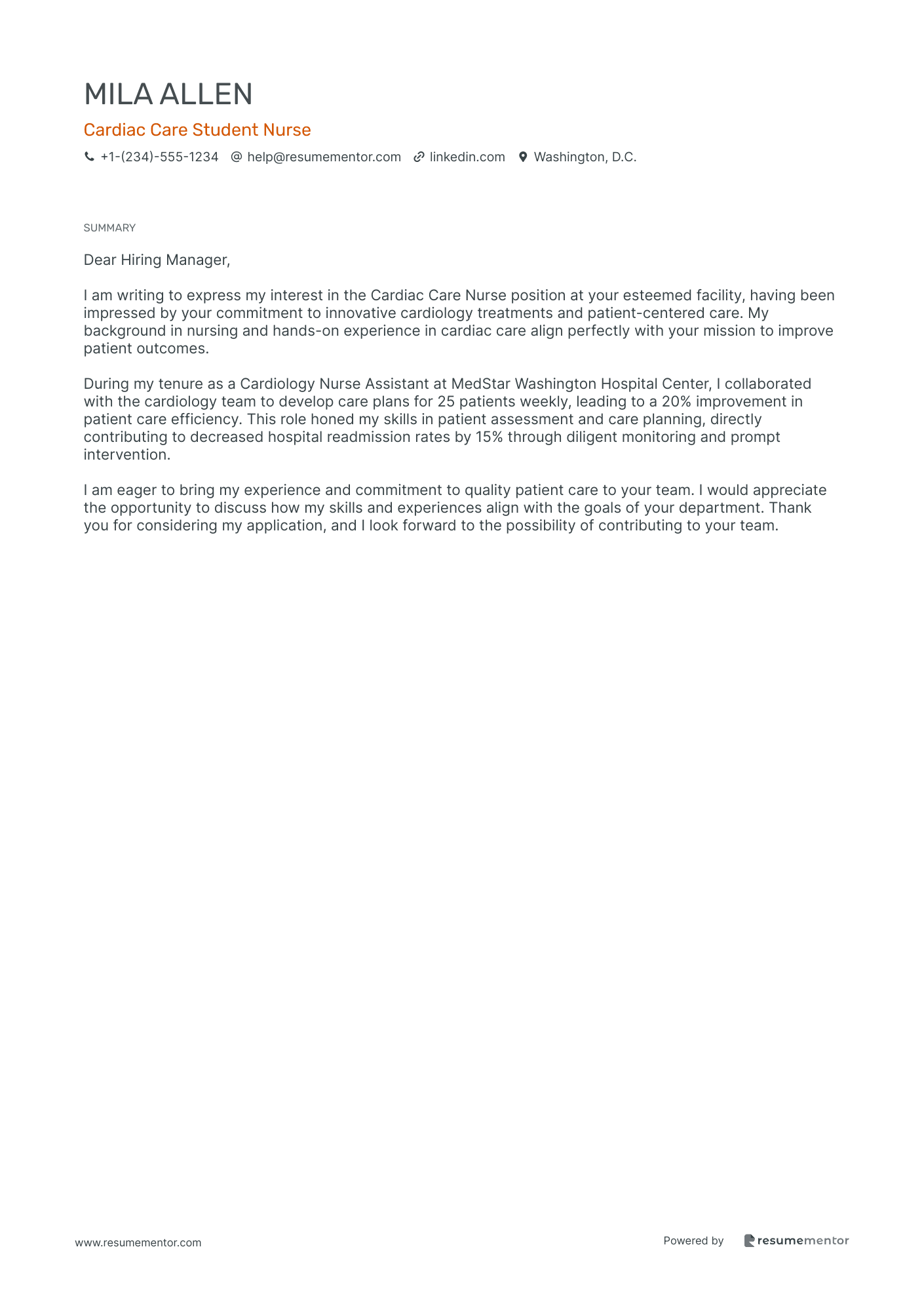
Cardiac Care Student Nurse
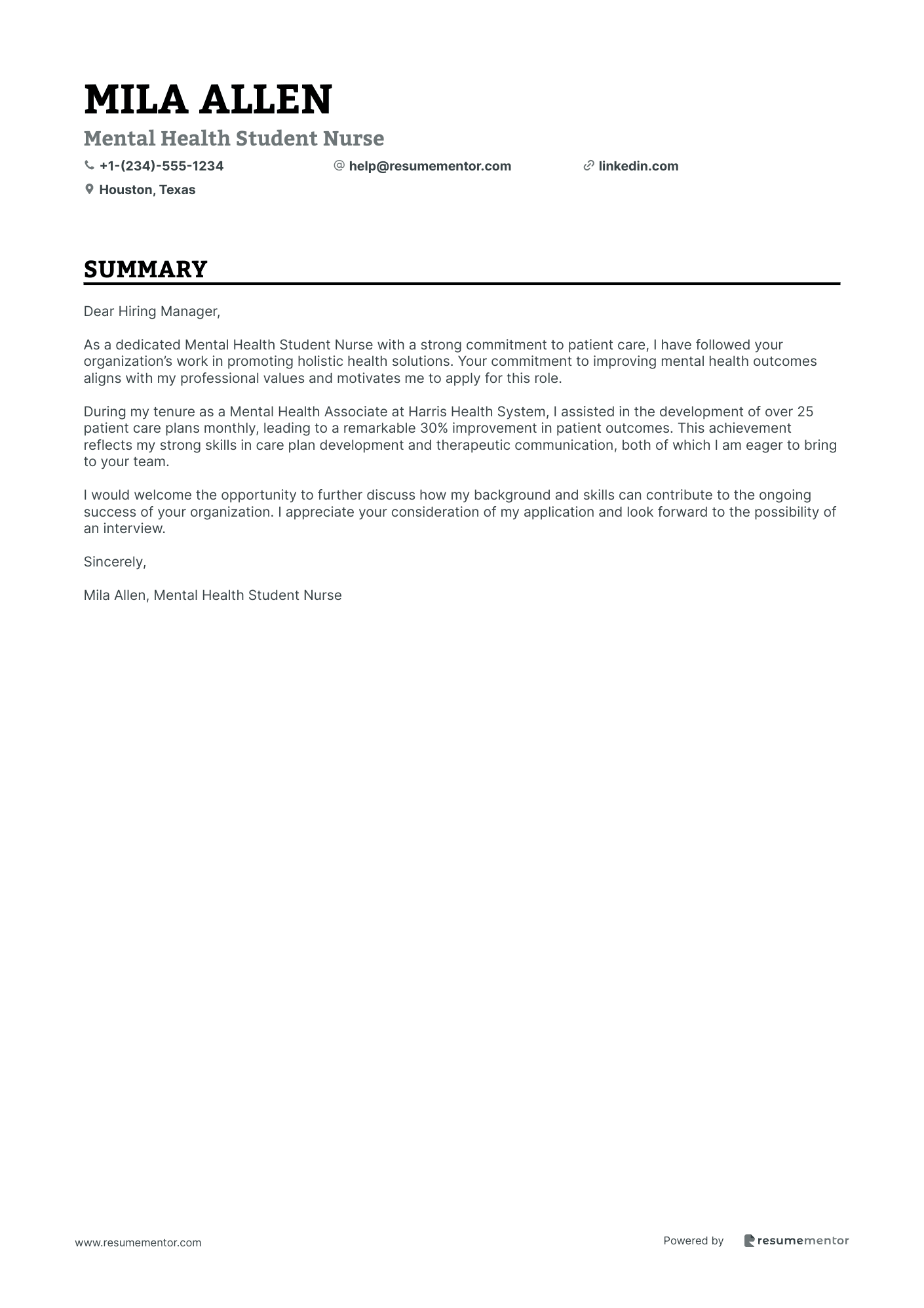
Mental Health Student Nurse
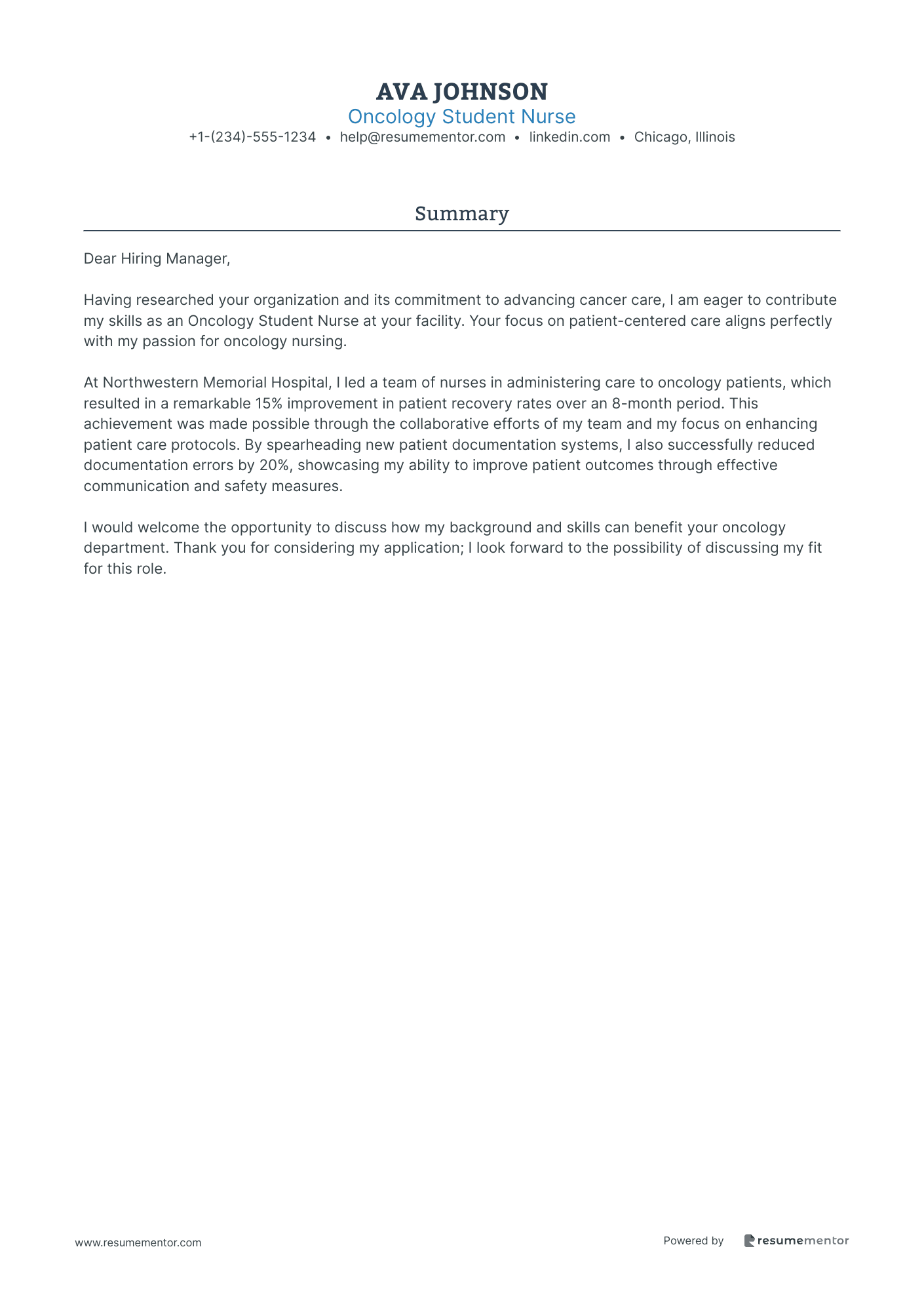
Oncology Student Nurse
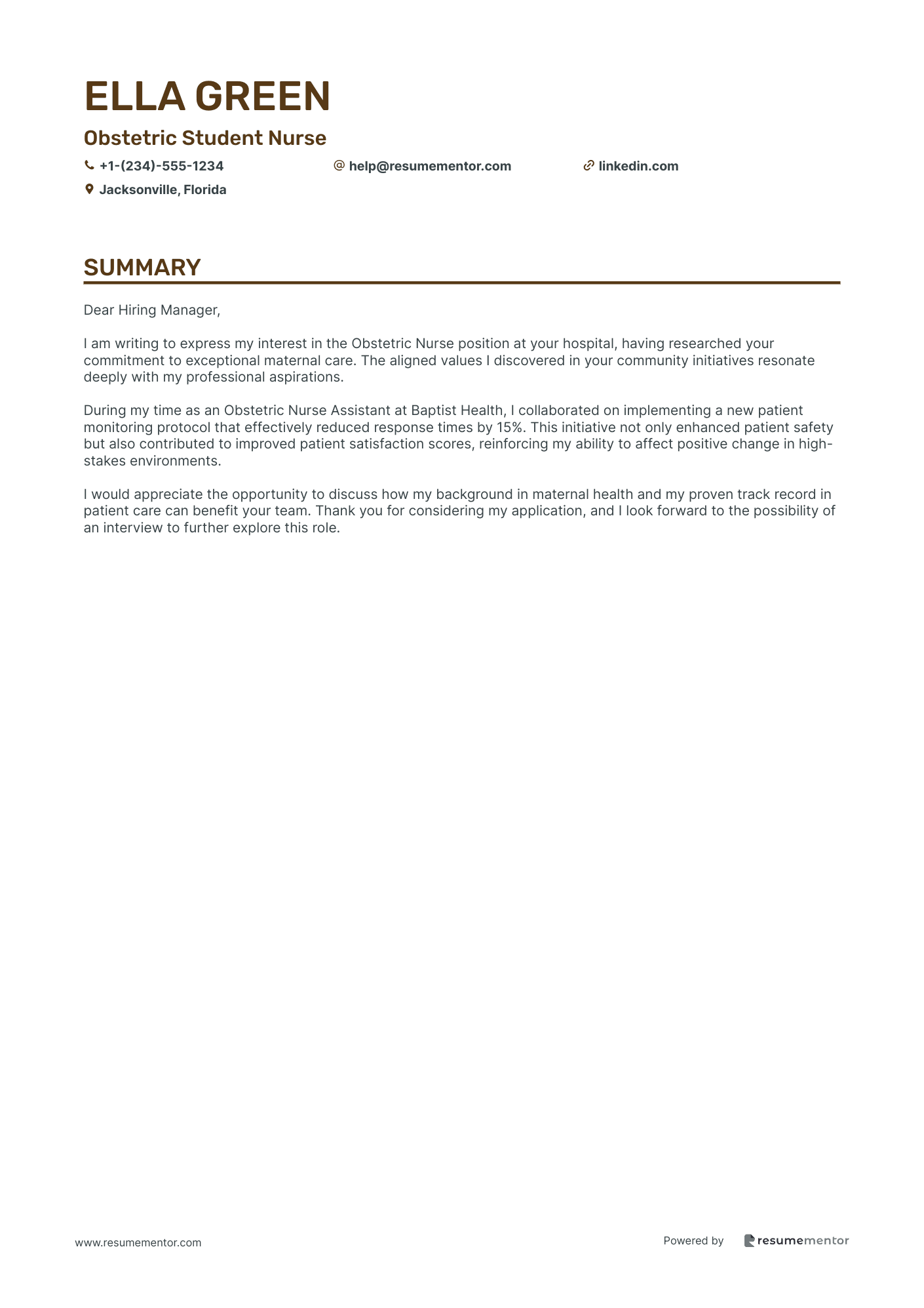
Obstetric Student Nurse
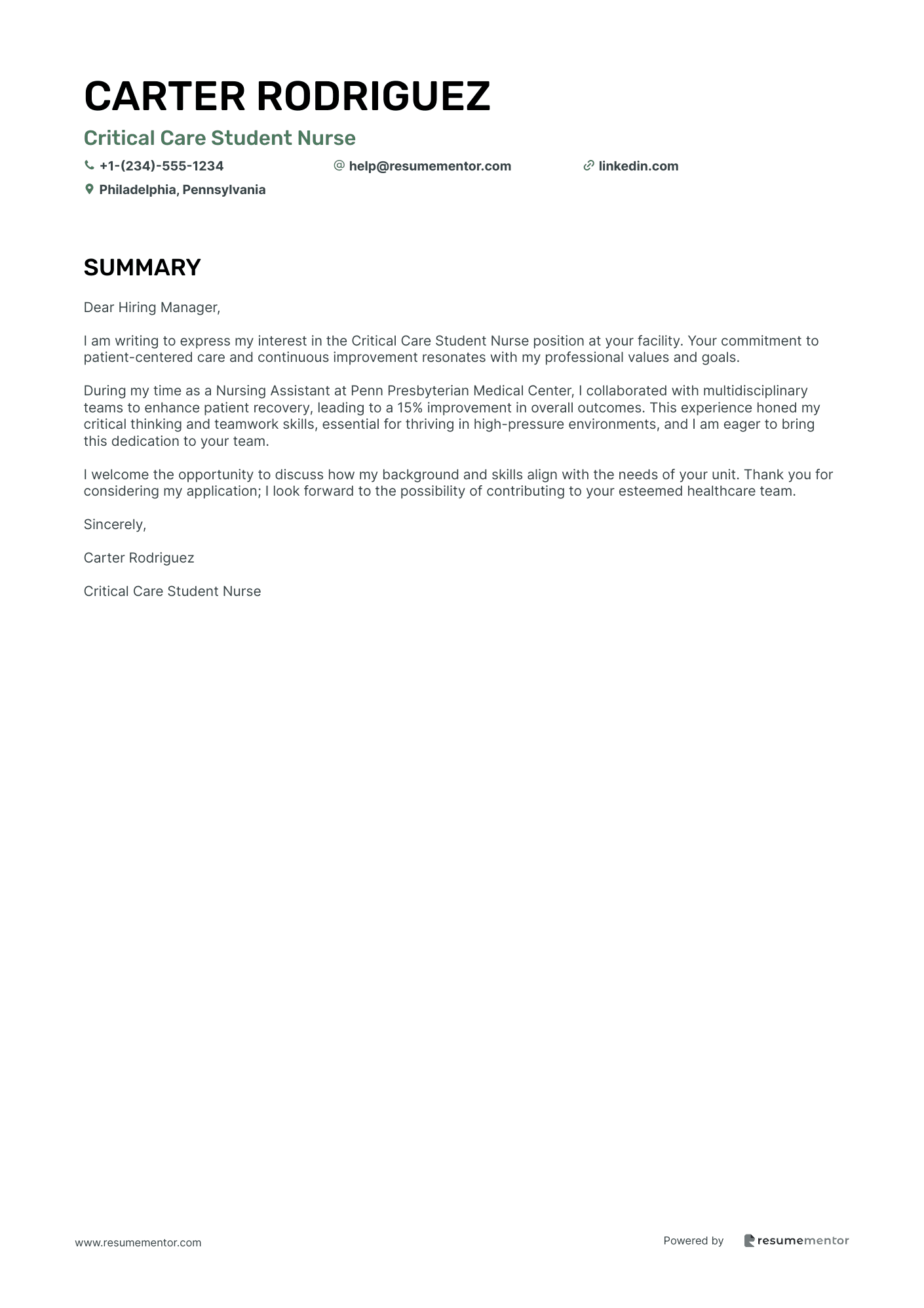
Critical Care Student Nurse
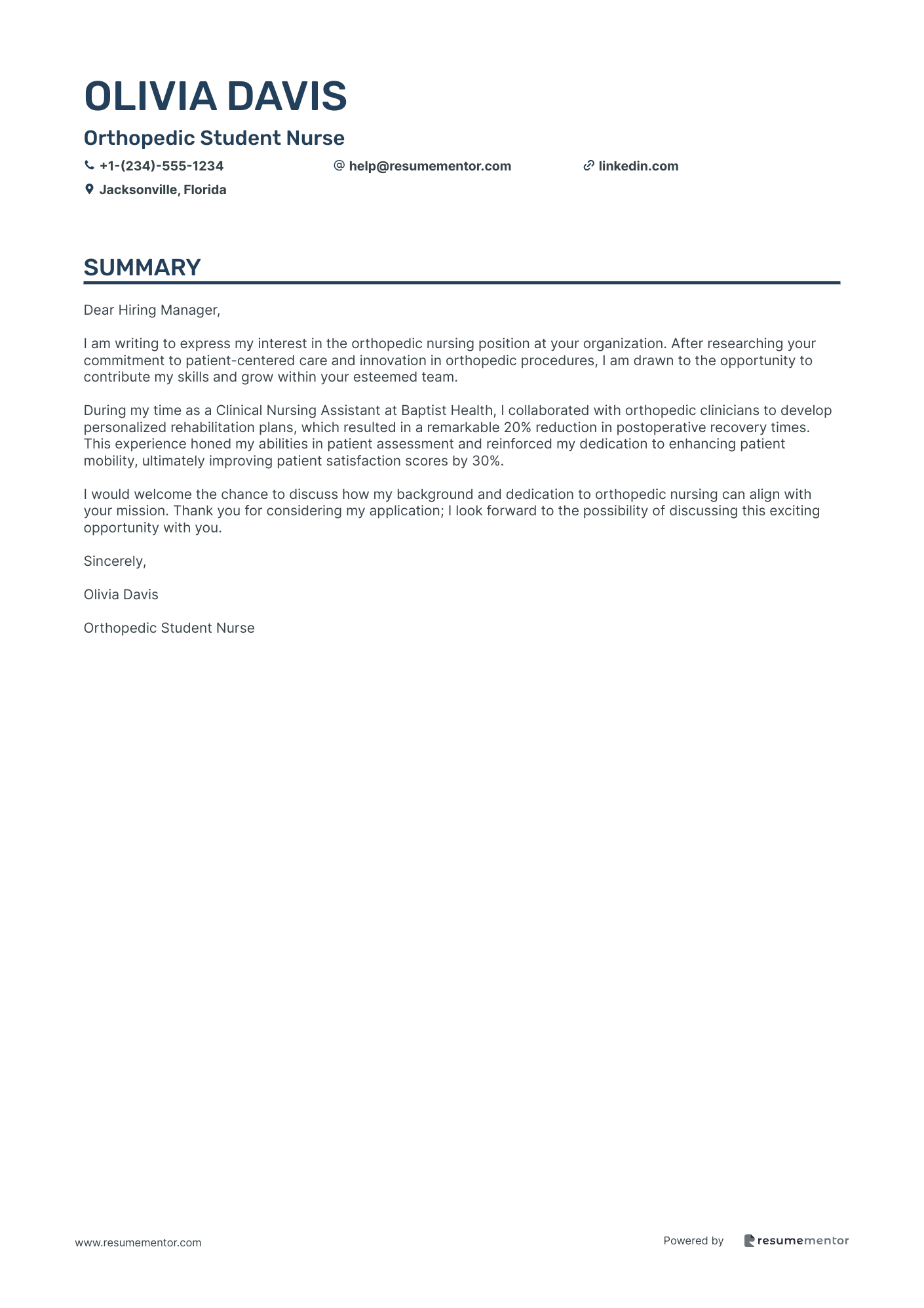
Orthopedic Student Nurse
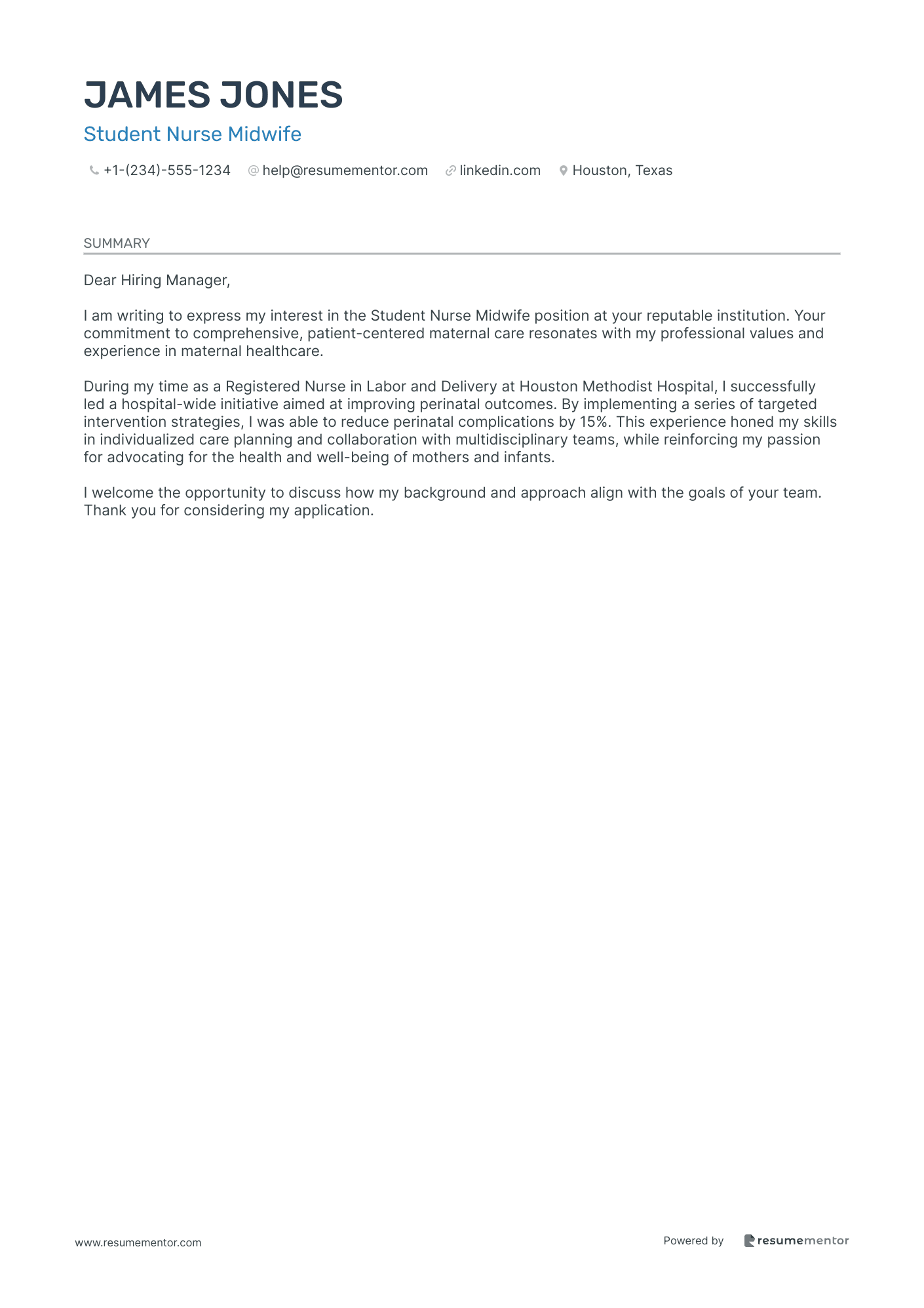
Student Nurse Midwife
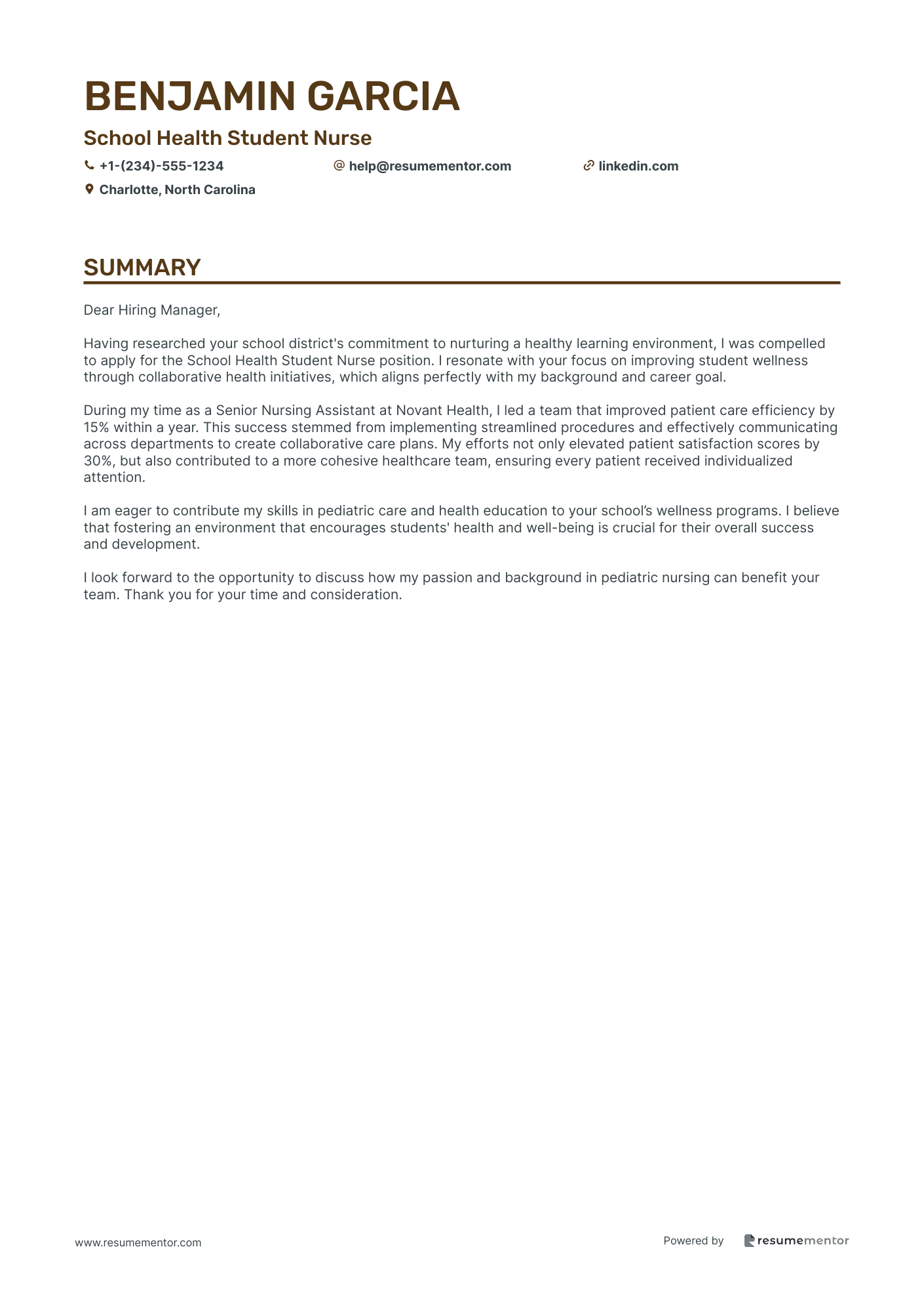
School Health Student Nurse

Pediatric Student Nurse cover letter sample
When crafting your cover letter, emphasize any experience you have with children or in healthcare settings. Highlight your clinical rotations or coursework in pediatrics, as these demonstrate your commitment to this specialty. Mention any certifications like Basic Life Support (BLS) or Pediatric Advanced Life Support (PALS), detailing the skills gained. Also, provide examples of how you've interacted positively with children and their families, following a 'skill-action-result' framework to show how your actions have improved patient care or comfort in previous settings.
Summary
Dear Hiring Manager,
I am writing to express my interest in the Pediatric Nursing position at your organization. Having researched your commitment to advancing pediatric health outcomes and supportive care practices, I am eager to contribute my skills and experiences to your team.
In my current role as a Pediatric Nursing Assistant at Texas Children's Hospital, I significantly improved patient recovery rates by 30% through direct monitoring and management of pediatric health plans. By collaborating closely with healthcare teams, I also established a robust health education initiative that led to a 90% improvement in families' understanding of home care practices, reflecting my dedication to patient and family engagement.
I welcome the opportunity to discuss how my skills in pediatric care and health education can further enhance the outstanding services at your facility. Thank you for considering my application.
Student Nurse Anesthetist cover letter sample
When crafting your cover letter, showcase any clinical rotations or hands-on experience in anesthesia. Highlight specific procedures you've assisted with, such as intubation or monitoring vital signs. Emphasize your ability to stay calm under pressure and your commitment to patient safety. Mention any additional training in pharmacology or pain management, including the duration, to demonstrate your knowledge base. Use clear examples of how you contributed to successful patient outcomes, focusing on your actions and the results they produced in high-stress situations.
Madison Taylor
Student Nurse Anesthetist
Summary
Dear Hiring Manager,
I am writing to express my interest in the Student Nurse Anesthetist position at your esteemed facility. After researching your commitment to patient-centered care and innovative practices, I am eager to contribute my skills and experiences to your team.
During my tenure as a Critical Care Nurse at Providence Health & Services, I led a team in implementing enhanced patient monitoring protocols that increased patient safety by 20%. This experience not only honed my analytical skills and attention to detail but also emphasized the importance of collaboration in delivering optimal patient outcomes.
I welcome the opportunity to further discuss how my background in nursing and anesthesia aligns with your team's goals. Thank you for considering my application; I look forward to the possibility of discussing my application in more detail.
Sincerely,
Madison Taylor
Student Nurse Anesthetist
Cardiac Care Student Nurse cover letter sample
When crafting your cover letter, focus on any clinical experience you have gained, particularly in cardiology or similar fields. Emphasize your patient care skills and ability to work in high-pressure situations. If you've completed relevant coursework, such as anatomy, physiology, or specific nursing classes, be sure to mention this, along with any hands-on training or internships. Provide examples of how you've successfully collaborated with healthcare teams or advocated for patient needs, detailing the skills you used and the positive outcomes achieved for patients or healthcare settings.
Mila Allen
Cardiac Care Student Nurse
Summary
Dear Hiring Manager,
I am writing to express my interest in the Cardiac Care Nurse position at your esteemed facility, having been impressed by your commitment to innovative cardiology treatments and patient-centered care. My background in nursing and hands-on experience in cardiac care align perfectly with your mission to improve patient outcomes.
During my tenure as a Cardiology Nurse Assistant at MedStar Washington Hospital Center, I collaborated with the cardiology team to develop care plans for 25 patients weekly, leading to a 20% improvement in patient care efficiency. This role honed my skills in patient assessment and care planning, directly contributing to decreased hospital readmission rates by 15% through diligent monitoring and prompt intervention.
I am eager to bring my experience and commitment to quality patient care to your team. I would appreciate the opportunity to discuss how my skills and experiences align with the goals of your department. Thank you for considering my application, and I look forward to the possibility of contributing to your team.
Mental Health Student Nurse cover letter sample
When applying for this position, emphasize any previous experience in mental health settings or related volunteer work. Highlight your understanding of mental health issues and any training in therapeutic communication techniques. If you have completed relevant coursework, such as 'Psychiatric Nursing' or 'Mental Health First Aid', be sure to mention these and their length. Provide concrete examples of how you've supported patients in distress or contributed to team efforts resolving conflicts, using a 'skill-action-result' framework to demonstrate your impact effectively.
Mila Allen
Mental Health Student Nurse
Summary
Dear Hiring Manager,
As a dedicated Mental Health Student Nurse with a strong commitment to patient care, I have followed your organization’s work in promoting holistic health solutions. Your commitment to improving mental health outcomes aligns with my professional values and motivates me to apply for this role.
During my tenure as a Mental Health Associate at Harris Health System, I assisted in the development of over 25 patient care plans monthly, leading to a remarkable 30% improvement in patient outcomes. This achievement reflects my strong skills in care plan development and therapeutic communication, both of which I am eager to bring to your team.
I would welcome the opportunity to further discuss how my background and skills can contribute to the ongoing success of your organization. I appreciate your consideration of my application and look forward to the possibility of an interview.
Sincerely,
Mila Allen, Mental Health Student Nurse
Oncology Student Nurse cover letter sample
When preparing your cover letter, highlight any clinical experiences, especially in oncology or related fields. Showcase your ability to work in fast-paced environments and your commitment to patient care. If you've completed relevant coursework, such as advanced pharmacology or cancer biology, mention these to demonstrate your knowledge base. Include any certifications, like Basic Life Support (BLS), to emphasize your preparedness. Use a 'skill-action-result' format to illustrate how your contributions improved patient outcomes or enhanced team collaboration, showcasing your dedication and effectiveness in a healthcare setting.
Ava Johnson
Oncology Student Nurse
Summary
Dear Hiring Manager,
Having researched your organization and its commitment to advancing cancer care, I am eager to contribute my skills as an Oncology Student Nurse at your facility. Your focus on patient-centered care aligns perfectly with my passion for oncology nursing.
At Northwestern Memorial Hospital, I led a team of nurses in administering care to oncology patients, which resulted in a remarkable 15% improvement in patient recovery rates over an 8-month period. This achievement was made possible through the collaborative efforts of my team and my focus on enhancing patient care protocols. By spearheading new patient documentation systems, I also successfully reduced documentation errors by 20%, showcasing my ability to improve patient outcomes through effective communication and safety measures.
I would welcome the opportunity to discuss how my background and skills can benefit your oncology department. Thank you for considering my application; I look forward to the possibility of discussing my fit for this role.
Obstetric Student Nurse cover letter sample
Highlight any clinical placements or internships where you have worked with expectant mothers or newborns. Strong interpersonal skills and empathy are essential for this field, so be sure to demonstrate your ability to build rapport with patients. Include any relevant coursework, such as maternal health or child development, and mention specific projects or research you've completed. Use concrete examples to show how your skills have improved patient care or fostered a supportive environment, emphasizing a 'situation-task-action' format to drive home your achievements.
Ella Green
Obstetric Student Nurse
Summary
Dear Hiring Manager,
I am writing to express my interest in the Obstetric Nurse position at your hospital, having researched your commitment to exceptional maternal care. The aligned values I discovered in your community initiatives resonate deeply with my professional aspirations.
During my time as an Obstetric Nurse Assistant at Baptist Health, I collaborated on implementing a new patient monitoring protocol that effectively reduced response times by 15%. This initiative not only enhanced patient safety but also contributed to improved patient satisfaction scores, reinforcing my ability to affect positive change in high-stakes environments.
I would appreciate the opportunity to discuss how my background in maternal health and my proven track record in patient care can benefit your team. Thank you for considering my application, and I look forward to the possibility of an interview to further explore this role.
Critical Care Student Nurse cover letter sample
When crafting your cover letter, spotlight any clinical rotations in intensive care or critical care settings. Highlight skills such as patient assessment and familiarity with medical equipment, which are crucial in high-pressure environments. Mention relevant coursework like 'Advanced Physiology' or 'Critical Care Management' to illustrate your knowledge base. Include experiences where you demonstrated teamwork and effective communication with healthcare staff, utilizing specific examples that showcase your ability to handle emergencies. Use a 'situation-task-action-result' framework to clearly convey your contributions and successes in previous placements.
Carter Rodriguez
Critical Care Student Nurse
Summary
Dear Hiring Manager,
I am writing to express my interest in the Critical Care Student Nurse position at your facility. Your commitment to patient-centered care and continuous improvement resonates with my professional values and goals.
During my time as a Nursing Assistant at Penn Presbyterian Medical Center, I collaborated with multidisciplinary teams to enhance patient recovery, leading to a 15% improvement in overall outcomes. This experience honed my critical thinking and teamwork skills, essential for thriving in high-pressure environments, and I am eager to bring this dedication to your team.
I welcome the opportunity to discuss how my background and skills align with the needs of your unit. Thank you for considering my application; I look forward to the possibility of contributing to your esteemed healthcare team.
Sincerely,
Carter Rodriguez
Critical Care Student Nurse
Orthopedic Student Nurse cover letter sample
When applying for a nursing role, it’s essential to highlight any clinical rotations or internships you've completed in orthopedic settings. Emphasize your hands-on experience with patient care and any specific procedures you've assisted with, such as casting or wound care. Discuss your ability to work in a team and communicate effectively with patients and families. If you've taken specialized courses, like anatomy or orthopedic nursing, include these to demonstrate your commitment. Utilize a 'skill-action-result' format to show how your involvement improved patient outcomes.
Olivia Davis
Orthopedic Student Nurse
Summary
Dear Hiring Manager,
I am writing to express my interest in the orthopedic nursing position at your organization. After researching your commitment to patient-centered care and innovation in orthopedic procedures, I am drawn to the opportunity to contribute my skills and grow within your esteemed team.
During my time as a Clinical Nursing Assistant at Baptist Health, I collaborated with orthopedic clinicians to develop personalized rehabilitation plans, which resulted in a remarkable 20% reduction in postoperative recovery times. This experience honed my abilities in patient assessment and reinforced my dedication to enhancing patient mobility, ultimately improving patient satisfaction scores by 30%.
I would welcome the chance to discuss how my background and dedication to orthopedic nursing can align with your mission. Thank you for considering my application; I look forward to the possibility of discussing this exciting opportunity with you.
Sincerely,
Olivia Davis
Orthopedic Student Nurse
Student Nurse Midwife cover letter sample
When crafting your cover letter, focus on any hands-on clinical experience, particularly in maternal and neonatal care. Highlight your ability to build rapport with patients and families, showcasing your skills in providing emotional support during labor. If you’ve completed relevant coursework or certifications such as prenatal care or childbirth education, mention them to demonstrate your commitment to professional development. Use the 'situation-task-action-result' approach to illustrate how your interventions positively impacted patient outcomes. Show your passion for promoting health and well-being in the community.
Summary
Dear Hiring Manager,
I am writing to express my interest in the Student Nurse Midwife position at your reputable institution. Your commitment to comprehensive, patient-centered maternal care resonates with my professional values and experience in maternal healthcare.
During my time as a Registered Nurse in Labor and Delivery at Houston Methodist Hospital, I successfully led a hospital-wide initiative aimed at improving perinatal outcomes. By implementing a series of targeted intervention strategies, I was able to reduce perinatal complications by 15%. This experience honed my skills in individualized care planning and collaboration with multidisciplinary teams, while reinforcing my passion for advocating for the health and well-being of mothers and infants.
I welcome the opportunity to discuss how my background and approach align with the goals of your team. Thank you for considering my application.
School Health Student Nurse cover letter sample
When applying for this role, it’s important to showcase any hands-on clinical experience, especially in pediatrics or school settings. Highlighting certifications, such as CPR or first aid training, can strengthen your application. Emphasize strong interpersonal skills, as building rapport with students and staff is essential. Provide examples of how you've successfully handled medical emergencies or provided health education, focusing on the positive outcomes you achieved. Use specific metrics or feedback to illustrate how your efforts positively impacted student health and well-being.
Benjamin Garcia
School Health Student Nurse
Summary
Dear Hiring Manager,
Having researched your school district's commitment to nurturing a healthy learning environment, I was compelled to apply for the School Health Student Nurse position. I resonate with your focus on improving student wellness through collaborative health initiatives, which aligns perfectly with my background and career goal.
During my time as a Senior Nursing Assistant at Novant Health, I led a team that improved patient care efficiency by 15% within a year. This success stemmed from implementing streamlined procedures and effectively communicating across departments to create collaborative care plans. My efforts not only elevated patient satisfaction scores by 30%, but also contributed to a more cohesive healthcare team, ensuring every patient received individualized attention.
I am eager to contribute my skills in pediatric care and health education to your school’s wellness programs. I believe that fostering an environment that encourages students' health and well-being is crucial for their overall success and development.
I look forward to the opportunity to discuss how my passion and background in pediatric nursing can benefit your team. Thank you for your time and consideration.
Related Articles

Continue Reading
Check more recommended readings to get the job of your dreams.
Resume
Resources
Tools
© 2026. All rights reserved.
Made with love by people who care.
